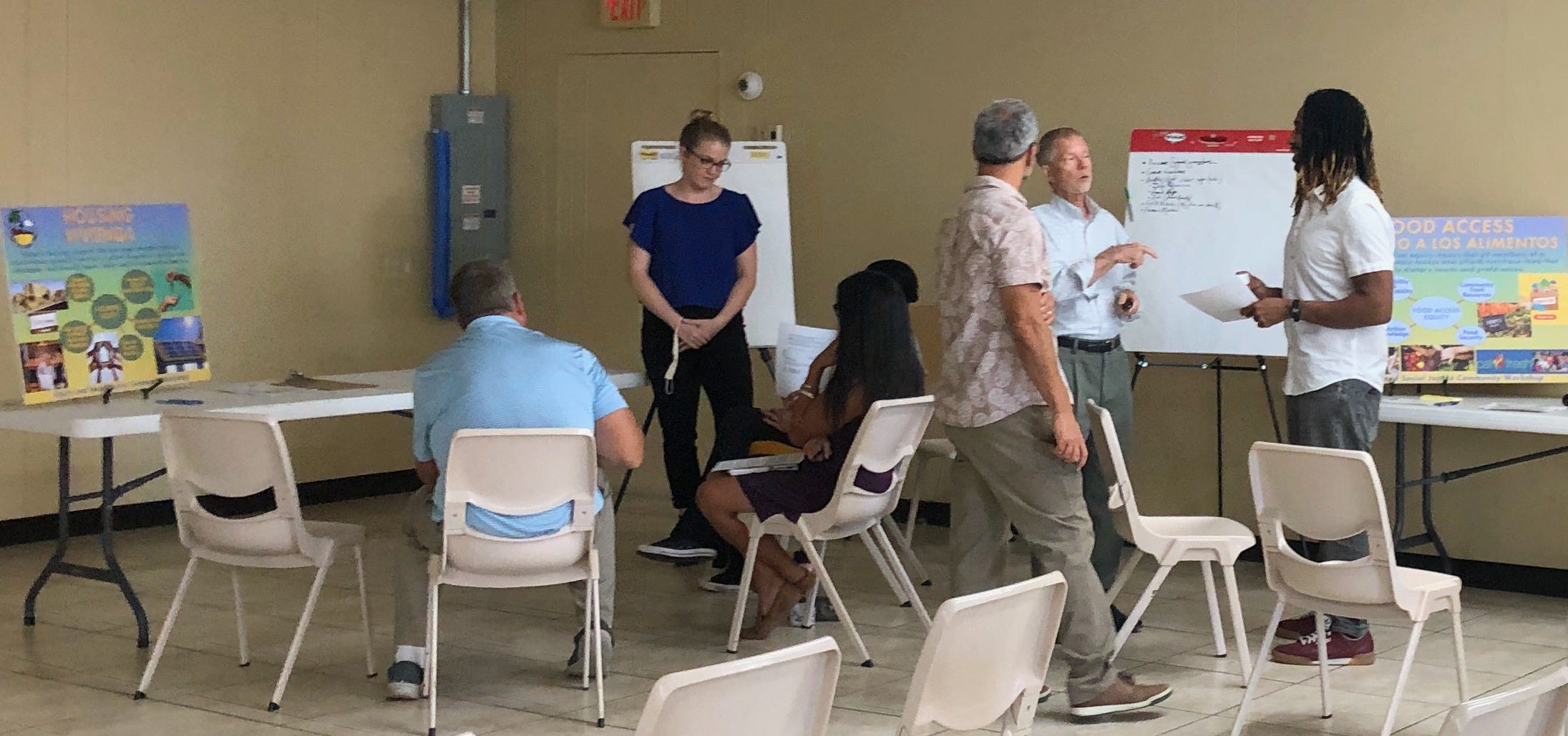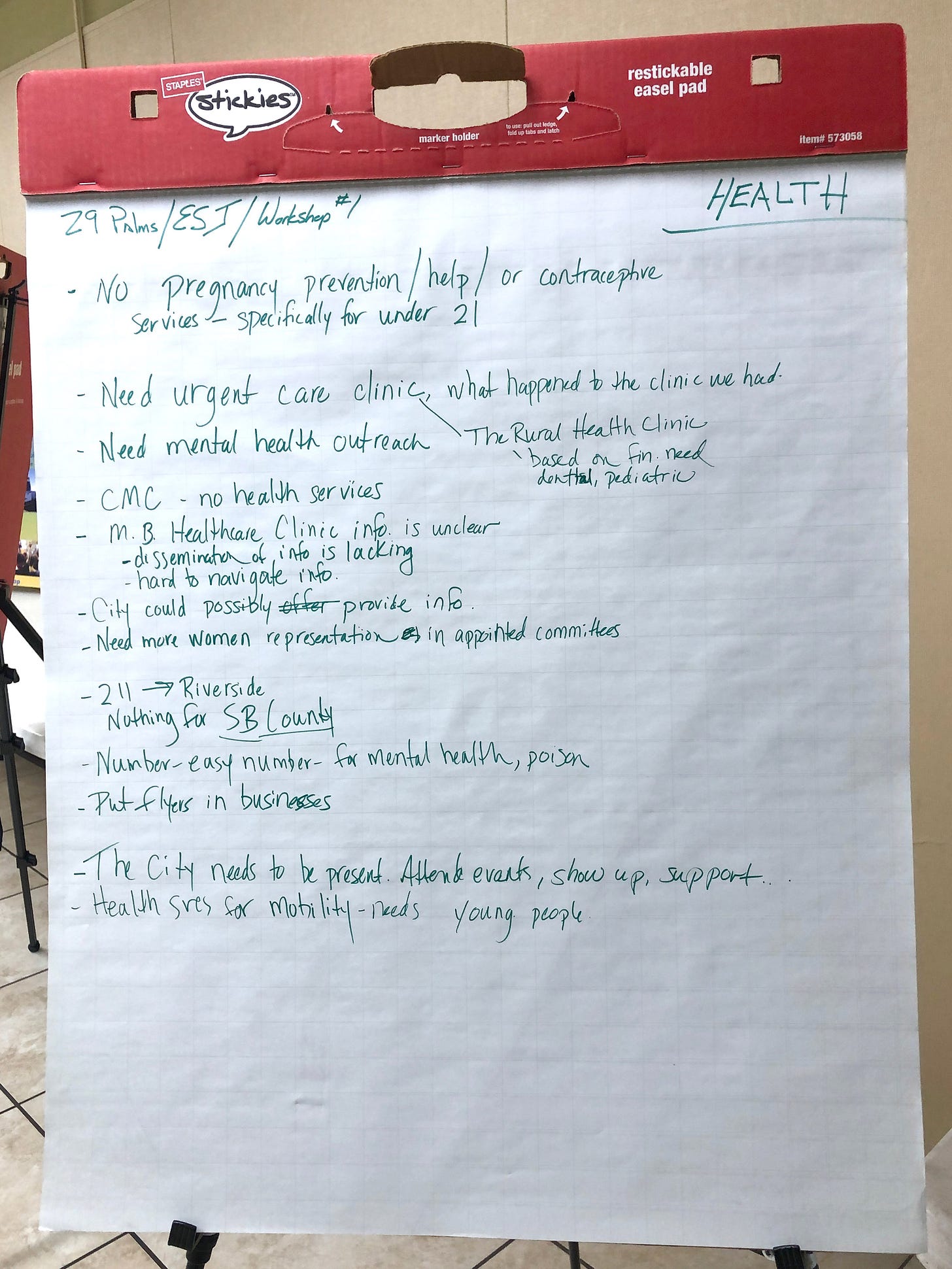WHY ATTENDING THE 9/29 SOCIAL JUSTICE AND EQUITY WORKSHOP IS SO IMPORTANT
A rare opportunity for more than three minutes of input on important issues

WHAT: Equity and Social Justice Element Community Workshops
Thursday September 15 and 29, 5:30 - 7:30pm
Patriotic Hall (Luckie Park) 5885 Luckie Avenue, Twentynine Palms
I made a last minute decision to attend the Equity and Social Justice Element1 Community Workshop on September 15 and I’m glad I did. The City promotion was opaque as usual so I wasn’t sure what it was or what to expect. And OMG was I surprised! I walked into Patriotic Hall to find six stations, each with four or five chairs and a super sized note pad staffed with an attendant ready to listen to Twentynine Palms resident concerns on education, food, health, housing, public services and transportation.
The Equity and Social Justice Element initiative and workshop combines several state-mandated topics which must be included in the City’s general plan. The City Council addressed this mandate with a resolution passed in October 2021 “denouncing xenophobia/racial injustice and strengthening commitment to racial equity/ diversity and affirming xenophobia as a public health crisis.” Section 2 of the resolution mandates “Collaborating with the City Council and Community to ensure public confidence that our general plan is equitable by ensuring that meaningful discussions are conducted, and a Racism element is added.” I assume the Equity and Social Justice Element workshops are meant to be the “meaningful discussion” referred to in the resolution.
The September 15th workshop was first time I’ve seen the City make an effort to collect input on such a wide variety of critical issues. It can be challenging to reach the Mayor and Council but the Terra Nova2 representatives at the workshop were informed on the topics, capable of leading resident discussions and they patiently listened while adding resident concerns to the notepads. In addition to Terra Nova staff and City residents, City Manager Frank Luckino, Council member Steven Bilderain and City Council District 4 candidate Octavious Scott attended the workshop.
It is absolutely worth your time to attend the next session on Thursday, September 29. Although the session starts at 5:30pm, the format is open and residents can join the workshop at any time until 7:30pm.
The information collected at the two workshops by Terra Nova will be assembled into a report presented to the Equity and Social Justice Element General Plan Advisory Committee (GPAC) and will impact how the City addresses racial equity and diversity in its policies, programs and services. Terra Nova and the Committee will also work to craft a new element for the City’s General Plan addressing equity and social justice, which will be presented to City Council for adoption. Community members on the committee are: Jonas Childs, Korina Cole, Jamie A. Garcia, Gary Horn, Lashara Maea and Mariana Wright-Mills3.
In addition to a flyer explaining the City Council’s Initiative on Equity and Social Justice, each table had a stack of easy-to-understand handouts describing how equity relates to each of the six highlighted topics. A PDF with all the flyers is at the top of this article and quick summaries plus photos of resident comments on note pads are below, by topic. It is absolutely worth your time to attend the next session on Thursday, September 29. Although the session starts at 5:30pm, the format is open and residents can join the workshop at any time until 7:30pm.
Below are the six Equity and Social Justice topics for public discussion and comment at the September 29 workshop:
1. Educational Equity
Per the Terra Nova handout: We are blessed with a diversity of educational opportunities. A single learning standard or practice applied to all students does not always lead to equal results. Students are individuals and all have different needs. By tending to the individual needs of each student, we can ensure the greatest possible outcomes. To achieve equity in education we must encourage and support leaders who can transform our institutions by eliminating inequitable practices and cultivating the unique gifts, talents, and interests of every child. Then success and failure will no longer be based on student identity - racial, cultural, economic, or any other social factor.
2. Food Equity
Per the Terra Nova handout: Food is a fundamental human right. Reliable access to nutritious and affordable food is essential to an active, healthy life. Conversely, food insecurity may lead to an increased risk of disease and other negative health outcomes.
3. Health Equity
Per the Terra Nova handout: Health equity is achieved when every person has the opportunity to “attain his or her full health potential” and no one is “disadvantaged from achieving this potential because of social positions or other socially determined circumstances. (Center for Disease Control)
Unfortunately, many social and environmental factors can limit a person’s access to, and continued use of, good health practices and healthcare. These are health inequities.
Research shows that problems like poverty, unemployment, low educational attainment, inadequate housing, lack of public transportation, exposure to violence, and neighborhood deterioration (social or physically) shape health and contribute to health inequities. (National Academy of Sciences)
4. Housing Equity
Per the Terra Nova handout: Housing Equity recognizes that advantages and barriers exist and acknowledges the problematic housing practices that have led to systemic inequality that disproportionately affect minorities, low-income households, the elderly, and other special groups. To ensure equity, we must make a commitment to correct and address discrimination in housing.
5. Public Services Equity
This was the most amorphous category - including everything from City services such as Parks and Recreation, City contracted services such as Fire and Sheriff, and County services such as Libraries to internal and outward facing City issues such as communications, engagement, transparency and accountability.
Per the Terra Nova handout: Equity is the absence of avoidable, unfair, or remediable differences among groups of people, whether those groups are designed socially, economically, demographically, or geographically or by other means of stratification. (World Health Organization)
What is a Public Service? A public service is any government service that addresses specific needs of the community. Public services are available to people within a city or other jurisdiction as provided directly through public sector agencies or via public financing to private businesses or voluntary organizations.
6. Transportation Equity
Per the Terra Nova handout:
• Transportation is essential to access schools, work, health services, housing options, as well as civic, social and recreational opportunities.
• Inadequate and unaffordable transportation systems mean some communities, particularly communities of color and low-income communities, may experience fewer of the benefits and opportunities associated with transportation, and a disproportionate share of the negative impacts.
• Transportation equity means access for all to safe, affordable, and reliable transportation options that meet the needs of EVERYONE in the community.
As defined in the flyer produced by Terra Nova: Equity, like equality is “focused on ensuring fairness, however, instead of making sure everyone has the same resources, equity strives to meet people where they are and provide resources in proportion to each person’s need.” “Social Justice is a movement that fights for fairness for people who have been historically oppressed, particularly Black, Indigenous and People of Color (BIPOC).
Terra Nova Planning and Research is an environmental consultant located in Palm Desert.
The GPAC committee list we were given has been revised - Martie Avels is no longer available to be a GPAC member and was replaced by Korina Cole.







